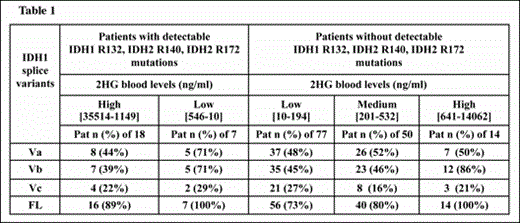Abstract
Introduction: Point mutations in the human cytosolic isocitrate dehydrogenase 1 (IDH1) gene, or its mitochondrial homolog IDH2 gene, are frequent in patients with AML, particularly at residues R132 in IDH1 and, R140 or R172 in IDH2. These mutations cause loss of the enzymeÕs ability to catalyze the conversion of isocitrate to α-ketoglutarate and result in neomorphic production of R(-)-2-hydroxyglutarate (2HG). It has been reported that 2HG functions as an ÒoncometaboliteÓ. Interestingly, serum levels of 2HG are highly variable among patients with the same mutations, and occasionally are elevated even in patients without detectable mutations. Previously Chaturvedi et al (ASH 2011, Abstract) showed that an IDH1 splice variant promotes leukemogenesis in vivo in the absence of IDH1/IDH2 mutations. In this study, we examined the frequency of this splice variant and two other IDH1 novel splice variants in patients with AML, and looked for any relationships between splice variants, mutations, and 2HG levels.
Methods: Cloning and sequencing analysis were used to identify IDH1 and IDH2 splice variants. DNA fragment analysis and capillary electrophoresis was used to evaluate expression of splice variants in 242 patients, of which 166 patients had 2HG blood levels measured. As controls we used two CD34+ bone marrow (BM) cells, three un-fractionated BM cells, and purified neutrophil and monocytes from three peripheral blood samples (PB) of normal donors. To detect point mutations, DNA fragments spanning exon 4 of IDH1 and IDH2 were amplified by nested polymerase chain reaction, and then PCR products were directly sequenced by Sanger sequencing.
Results: We studied three splice variants of IDH1: IDH1Va (reported previously), and two variants discovered in the course of this study, IDH1Vb and IDH1Vc. Alignment analyses of these splice variants indicated that the IDH1Vb variant transcripts do not cause a frame shift, and retain native start and stop codons, while IDH1Va and IDH1Vc transcripts have frame shifts that create premature stop codons in the last exon. No splice variants of IDH2 were identified in these patient samples. Of the 242 AML samples (PB-166, BM-76) 51% expressed IDH1Va, 49% expressed IDH1Vb and 23% expressed IDHVc, almost always in combination with full length of IDH1 transcripts (IDH1FL). These IDH1 splice variants were not detected in the normal cells analyzed.
We compared expression of IDH1 splice variants, presence of common point mutations, and levels of 2-HG in the 166 patients (Table 1). As expected, patients with point mutations in IDH1 or IDH2 generally had high levels of 2HG in their blood (> average 6104 ng/ml). Seven patients had detectable IDH1/IDH2 point mutations but low 2-HG (< average 222 ng/ml) blood levels. In these patients IDH1Va and IDH1Vb splice variants were detected frequently; Five of 7 patients expressed these variants together and/or in combination with the IDH1-FL mRNA. In contrast, 14 patients had no detectable IDH1/IDH2 mutations but elevated (> average 4430 ng/ml) 2-HG blood levels, twelve of these overexpressed the IDH1Vb splice variant transcripts (Table 1). Six of these 12 patients expressed only IDH1Vb transcripts together with IDH1FL; the average 2HG blood levels in these patients was 2875ng/ml.
Conclusion: Though high 2-HG blood levels are correlated with the presence of IDH1/IDH2 mutations, the degree of 2-HG elevation may be altered by other events such as alternative splicing. The expression of IDH1 splice variants was commonly detected in AML samples. Studies to examine the effects of splice variants of IDH1 on 2HG production and transformation are underway.
Fathi:Millennium: Research Funding; Seattle Genetics: Advisory Board, Advisory Board Other; Agios: Advisory Board, Advisory Board Other. Yen:Agios: Employment. Kim:Agios: Employment. Zhu:Agios Pharmaceuticals: Employment, Stockholder Other. Kim:Yes, same as for being Author of Abstract #70656 Hide Full Conflict-of-Interest Disclosure I have relevant financial relationship(s) to disclose. Yes Name of Organization Type of relationship Agios Pharmaceuticals: Employment. Steensma:Novartis: Consultancy; Celgene: Consultancy; Ariad: Equity Ownership; Amgen: Consultancy. Stone:Agios: Consultancy.
Author notes
Asterisk with author names denotes non-ASH members.


This feature is available to Subscribers Only
Sign In or Create an Account Close Modal